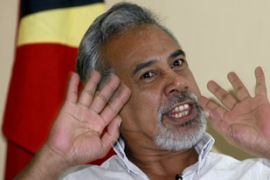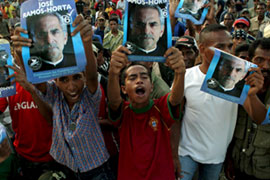Gusmao warns of Timor violence
President blames Fretilin party for violent clashes in run-up to key national poll.

Published On 7 Apr 2007
Rivalry
On Wednesday fierce clashes broke out in Dili as rival party supporters threw rocks at each other during the last day of official campaigning.
“Now the world can see that there’s a party that instead of calling their supporters to calm down, they allow their supporters to provoke, to throw stones, to fight in the streets,” Gusmao said.
Guterres is a frontrunner among eight presidential candidates but faces Jose Ramos-Horta, a high-profile candidate who was awarded a Nobel Peace Prize during the struggle for independence from Indonesia.
Gusmao, a charismatic independence hero and ally of Ramos-Horta, is not running for re-election but has said he would run for prime minister in parliamentary elections due this year.
A Fretilin campaign official, Carmen da Cruz, denied that her party endorsed violence.
“From the beginning, Fretilin leaders have called for tolerance and patience… but maybe because there were too many people what happened was beyond the control of the party leaders,” she told Reuters.
‘No place for violence’
 |
| Guterres faces a tough opponent in Nobel laureate Ramos-Horta [EPA] |
Japan, Portugal, New Zealand, the US and the European Union have called for calm in East Timor as the people head to the polls on Monday.
“There’s no place for violence or the use of other coercive means during voting or in response to election results,” said a statement signed by the respective representatives.
The Fretilin Party led by Mari Alkatiri, the former prime minister, led East Timor’s struggle against Indonesian rule and is the dominant party in parliament.
East Timor was wracked by violence ahead of its independence in 2002 and 30 people were killed in a clashes last year after the country descended into chaos again whenr the government sacked 600 rebellious soldiers.
The violence drove about 100,000 people from their homes and prompted further intervention by foreign troops.
Source: News Agencies